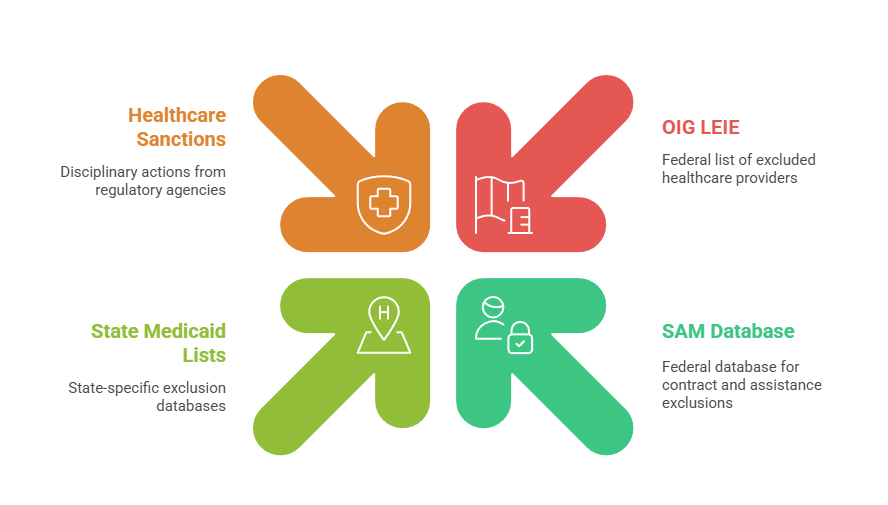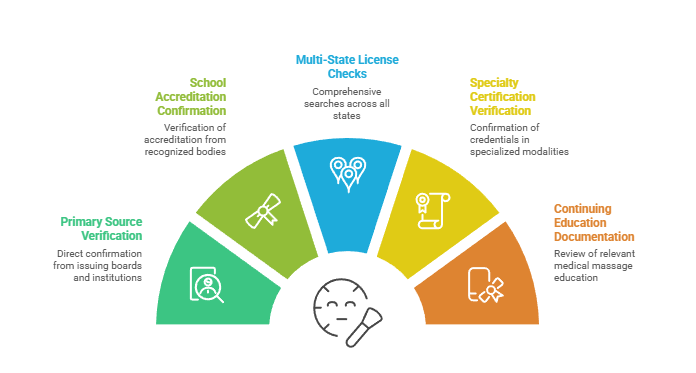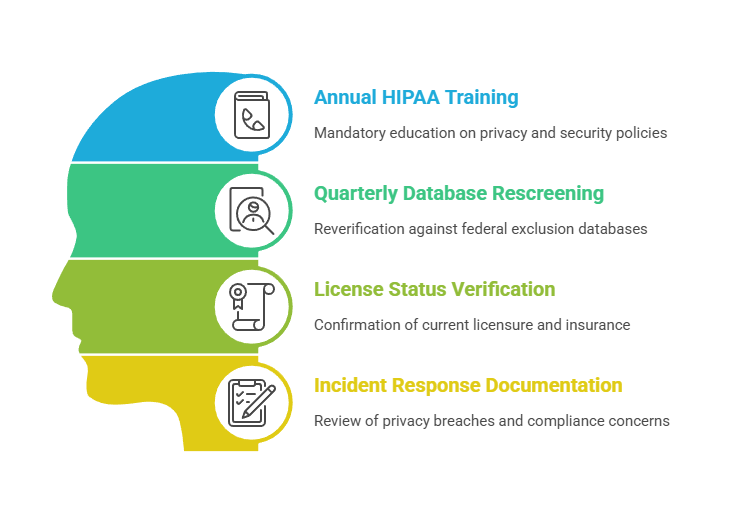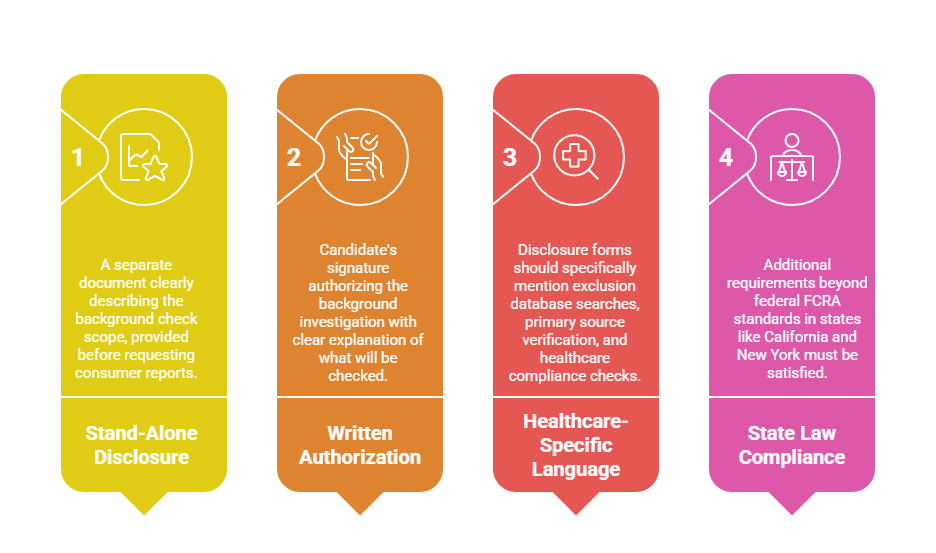Medical spas operate under healthcare facility regulations requiring enhanced background screening protocols that include HIPAA compliance verification, healthcare sanctions checks, and potential access to medical records clearances—standards that traditional massage establishments typically don't face. Traditional spas focus primarily on state licensing verification and basic criminal checks, while medical spas must meet rigorous healthcare industry employment standards comparable to clinical settings, creating significantly different hiring landscapes for massage therapists across these two wellness environments.
Key Takeaways
- Medical spas classify as healthcare facilities and require massage therapists to undergo enhanced background screening that includes HIPAA compliance training verification, Office of Inspector General (OIG) exclusion list checks, and healthcare-specific criminal background reviews.
- Traditional massage establishments typically conduct standard criminal background checks focused on licensing verification, sex offender registry searches, and general criminal history without healthcare-specific screening components.
- Massage therapist screening requirements vary significantly based on whether practitioners have potential access to protected health information (PHI), medical records, or work alongside licensed medical professionals performing procedures.
- Medical spa employee background check protocols must align with healthcare liability insurance requirements, which often mandate quarterly exclusion list monitoring and ongoing screening throughout employment.
- HIPAA background check requirements for medical spas include verification that massage therapists complete mandatory privacy and security training before accessing any systems containing patient information.
- Spa industry employment standards differ by state, but medical spas face additional federal healthcare regulations beyond standard massage therapy licensing requirements that traditional spas must meet.
- The screening cost differential between medical spa and traditional spa hiring processes can range from $50-$150 per candidate due to enhanced healthcare verification requirements.
- Medical massage therapist qualifications in healthcare settings often require documented continuing education in medical conditions, contraindications, and healthcare compliance topics beyond traditional massage certification.
Understanding the Regulatory Landscape for Massage Therapist Employment
The wellness industry encompasses a broad spectrum of establishments. Day spas offer relaxation services while medical spas provide treatments under physician supervision. This distinction creates fundamentally different regulatory frameworks that directly impact massage therapist screening requirements.
Healthcare facility classification determines which background screening protocols apply to massage therapist positions. Medical spas that provide services involving medical procedures, prescription treatments, or physician oversight typically qualify as healthcare providers under federal definitions. This classification triggers compliance obligations under the Health Insurance Portability and Accountability Act (HIPAA), the Affordable Care Act's provider screening provisions, and various state healthcare employment laws. Traditional wellness centers primarily answer to state massage therapy boards and local business licensing authorities without these additional healthcare requirements.
Federal Healthcare Regulations Affecting Medical Spas
Medical spas operating as healthcare facilities must comply with screening requirements established by the Centers for Medicare & Medicaid Services (CMS). The Affordable Care Act introduced enhanced screening requirements for healthcare providers, including verification against federal exclusion databases. Even massage therapists who don't directly bill Medicare or Medicaid may need clearance showing they don't appear on exclusion lists.
The healthcare exclusion verification process includes several critical components:

- OIG List of Excluded Individuals and Entities (LEIE): Contains healthcare providers excluded from federally funded healthcare programs, with penalties up to $10,000 per item or service provided by excluded persons.
- System for Award Management (SAM) Database: Includes individuals and entities excluded from federal contracting and certain federal assistance programs relevant to healthcare facilities.
- State Medicaid Exclusion Lists: Each state maintains its own exclusion database that may include individuals not listed on federal databases.
- Healthcare Sanctions Verification: Checks against state medical boards, nursing boards, and other healthcare regulatory agencies that publish disciplinary actions.
HIPAA regulations don't prescribe specific background check elements but require reasonable and appropriate screening measures. Medical spas must implement policies ensuring that all employees, including massage therapists, receive appropriate screening before accessing electronic health records, scheduling systems containing patient data, or treatment areas where PHI might be visible.
State-Level Massage Therapy Licensing and Background Checks
Every state with massage therapy licensing laws establishes baseline background check requirements for initial licensure. These typically include fingerprint-based criminal history checks processed through state and FBI databases. Traditional spas verify that massage therapists hold current, valid state licenses, which confirms the therapist already passed these initial background screenings.
Medical spas often implement additional screening layers beyond license verification due to healthcare liability concerns. While a massage therapy license confirms basic criminal clearance, medical spa employee background check protocols may include additional searches for healthcare-specific violations, professional sanctions, and verification of credentials beyond basic massage certification. States like California, Florida, and Texas—which have large medical spa industries—have increasingly clarified that massage therapists in medical settings require additional oversight comparable to other healthcare support staff.
Core Differences in Background Screening Standards
The fundamental distinction between massage therapist screening requirements in medical versus traditional spas centers on healthcare facility obligations. Medical spas must demonstrate to liability insurers, healthcare attorneys, and regulatory bodies that their screening processes meet healthcare industry standards. Traditional spas focus on ensuring therapists hold appropriate licenses and don't present obvious risks to client safety.
Wellness practitioner background check protocols in medical settings reflect the higher liability exposure these facilities face. Medical spas where nurses administer injectables, physicians perform laser treatments, or practitioners access medical-grade equipment create environments where even non-medical staff must understand healthcare compliance. Massage therapists working alongside medical professionals need familiarity with clinical protocols, patient privacy requirements, and medical emergency procedures that traditional spa employees don't typically encounter.
Criminal Background Check Scope and Lookback Periods
Traditional spa industry employment standards typically involve seven-year criminal background checks covering felonies and misdemeanors relevant to client safety. Most traditional spas follow Fair Credit Reporting Act (FCRA) guidelines for employment screening, which generally limit reporting of most criminal convictions to seven years. Some states impose different timeframes, and certain serious crimes have no time limit.
Medical spa criminal background checks often extend beyond standard seven-year windows for specific offense categories. Healthcare facilities commonly implement lifetime lookback periods for crimes involving violence, sexual misconduct, theft, fraud, or controlled substances. This enhanced scrutiny reflects healthcare industry best practices and insurance carrier requirements. Some medical spa background screening protocols specifically search for healthcare-related offenses such as Medicare/Medicaid fraud, patient abuse, prescription drug diversion, or violations of healthcare regulations that wouldn't necessarily appear in standard employment background checks.
Professional License and Credential Verification
Both medical and traditional spas verify that massage therapists hold valid state licenses. The verification depth differs significantly between the two settings. Traditional establishments typically confirm current licensure through state board websites or direct board contact, verifying the license number, expiration date, and absence of public disciplinary actions.
Medical massage therapist qualifications undergo more rigorous verification in healthcare settings. The enhanced verification process includes several key components:

- Primary Source Verification: Direct confirmation from the issuing board or educational institution rather than relying on candidate-provided documentation.
- School Accreditation Confirmation: Verification that the massage therapy school holds appropriate accreditation from recognized accrediting bodies.
- Multi-State License Checks: Comprehensive searches across all states where the candidate previously practiced or held licenses.
- Specialty Certification Verification: Direct confirmation of credentials in oncology massage, lymphedema treatment, or other medically-oriented modalities requiring additional training.
- Continuing Education Documentation: Review of specific continuing education in medical massage modalities relevant to the healthcare setting.
This comprehensive approach ensures medical spas hire massage therapists with legitimate credentials and appropriate training. Primary source verification takes longer and costs more than traditional verification methods but provides higher certainty that credentials are valid.
HIPAA Compliance and Protected Health Information Access
HIPAA background check requirements create one of the most significant distinctions between medical and traditional spa employment screening. Any massage therapist in a medical spa who might access electronic health records, view patient charts, or use systems containing protected health information becomes part of the covered entity's workforce under HIPAA definitions. Traditional spas never encounter these specific healthcare privacy obligations.
Medical spas must conduct risk assessments determining which positions require access to PHI and implement appropriate screening measures. Even if massage therapists don't directly access medical records, they may encounter patient information through scheduling systems, intake forms, treatment notes, or casual exposure in clinical areas. The HIPAA Security Rule requires covered entities to implement procedures for determining workforce member access to electronic PHI.
Pre-Employment HIPAA Readiness Assessment
Medical spa employee background check processes increasingly include HIPAA readiness assessments before making employment offers. These assessments help medical spas evaluate whether candidates demonstrate the discretion and privacy awareness necessary for healthcare environments. While not technically "background checks," these assessments provide valuable screening information.
Some medical spas require massage therapists to sign HIPAA compliance agreements as part of the application process. This practice helps establish that employees received notice of their privacy obligations from the outset. Unlike traditional spas where client information might be casually discussed, medical spas must maintain strict confidentiality protocols.
Ongoing HIPAA Compliance Monitoring
Massage therapist screening requirements in medical spas extend beyond initial hiring into ongoing employment monitoring. HIPAA regulations require periodic training (typically annually) on privacy and security policies. Medical spas must maintain documentation that all workforce members completed required education.
The ongoing compliance monitoring framework includes:

- Annual HIPAA Training: Mandatory education on current privacy and security policies with documented completion records.
- Quarterly Database Rescreening: Reverification against federal exclusion databases to ensure continued compliance with healthcare standards.
- License Status Verification: Confirmation of current licensure and malpractice insurance at regular intervals throughout employment.
- Incident Response Documentation: Review of any privacy breaches or compliance concerns that arise during employment.
Traditional spas rarely conduct this type of ongoing screening. They typically reverify licenses only when employees transfer locations or when the spa undergoes ownership changes.
Healthcare Sanctions and Exclusion Database Checks
One of the most distinctive elements of medical spa employee background check protocols involves screening against healthcare-specific sanctions databases. These checks search for individuals excluded from participation in federal healthcare programs or sanctioned by healthcare regulatory bodies. Massage therapists in medical spas may need clearance from these databases even though they typically aren't billing Medicare or Medicaid directly.
Hiring or contracting with excluded individuals can result in severe penalties. Civil monetary penalties can reach up to $10,000 per item or service provided by the excluded person. While massage therapists working in medical spas rarely appear on these lists, medical spa operators face potential liability if they fail to screen workforce members.
OIG and SAM Exclusion Screening Protocols
Medical spas implementing comprehensive screening programs check candidates against both the OIG LEIE database and the System for Award Management (SAM) exclusion list. Healthcare compliance attorneys frequently recommend checking both databases for all healthcare facility employees who might interact with patients or access healthcare information. This dual-database approach provides thorough coverage of federal exclusion lists.
Wellness practitioner background check best practices in medical settings include monthly or quarterly rescreening of current employees. Healthcare sanctions can occur after employment begins. Medical spas bear responsibility for ensuring their workforce remains clear of exclusions throughout employment. This ongoing monitoring represents a significant administrative burden that traditional spas never face, often requiring dedicated compliance software to manage effectively.
State Medicaid Exclusion and Healthcare Sanctions
Beyond federal databases, medical spas may need to screen massage therapists against state Medicaid exclusion lists and state healthcare licensing board sanctions. Each state maintains its own Medicaid exclusion database. State medical boards, nursing boards, and other healthcare regulatory agencies publish disciplinary actions that medical spas should review during hiring processes.
Some states have implemented consolidated healthcare sanctions databases that aggregate disciplinary actions across multiple healthcare professions. Medical massage therapist qualifications review should include checking whether candidates have faced sanctions from any healthcare licensing board, even in other states or different professions. This comprehensive approach helps medical spas avoid hiring individuals with problematic healthcare compliance histories.
Side-by-Side Comparison: Medical Spa vs. Traditional Spa Screening Standards
Understanding the practical differences in massage therapist screening requirements helps HR managers implement appropriate protocols. Healthcare facility classification fundamentally changes hiring approaches across multiple dimensions. The following sections break down these critical distinctions.
Core Screening Components Comparison
The table below illustrates how basic screening elements differ between medical spa and traditional spa environments. These fundamental components form the foundation of any employment screening program. Cost and timeline variations reflect the depth of verification required in healthcare settings.
| Screening Component | Medical Spa Requirements | Traditional Spa Requirements |
| Criminal Background Check | Comprehensive check including healthcare-specific offenses; often lifetime lookback for specific crimes | Standard 7-year criminal history check; focus on violent crimes, sexual offenses, theft |
| License Verification | Primary source verification from issuing board; multi-state check if applicable | Basic license verification through state board website or direct contact |
| Federal Exclusion Databases | Mandatory OIG LEIE and SAM database checks; quarterly or monthly ongoing monitoring | Not typically conducted; not required for non-healthcare facilities |
| State Exclusion Lists | Check state Medicaid exclusion lists and healthcare board sanctions across multiple states | Not typically conducted unless state massage board specifically requires |
| Screening Timeline | 10-15 business days average; may extend to 20+ days with primary source verification | 5-7 business days average for standard checks |
| Estimated Cost Per Candidate | $125-$275 including healthcare-specific database searches | $35-$75 for standard criminal check and basic license verification |
Compliance and Ongoing Monitoring Requirements
Medical spas face substantially different compliance documentation and ongoing monitoring obligations compared to traditional wellness facilities. These requirements extend throughout the employment relationship. Insurance carriers and regulatory bodies expect medical facilities to maintain systematic oversight programs.
| Compliance Area | Medical Spa Requirements | Traditional Spa Requirements |
| HIPAA Compliance | Pre-employment readiness assessment; mandatory training before PHI access; signed compliance agreements | Not applicable; general client confidentiality policies without formal training |
| Professional References | Healthcare reference checks; verification from previous medical employers; compliance questions | Standard employment references; general performance inquiries |
| Education Verification | Primary source verification; confirmation of school accreditation; medical certification verification | Confirmation of massage therapy certificate; basic verification from candidate documents |
| Ongoing Monitoring | Quarterly exclusion database checks; annual license reverification; continuous HIPAA training | License reverification at renewal time; typically no systematic monitoring |
| Insurance Requirements | Professional liability with medical/healthcare rider; often $1-2 million coverage | Professional liability insurance; typically $500,000-$1 million coverage |
| Compliance Documentation | Extensive documentation for potential audits; specific retention periods under healthcare regulations | Basic employment file documentation; standard HR record retention |
This comparison demonstrates why spa industry employment standards vary dramatically based on healthcare facility classification. Medical spas face substantially higher screening costs and more complex ongoing compliance obligations.
Insurance Requirements and Liability-Driven Screening
Healthcare liability insurance carriers significantly influence massage therapist screening requirements in medical spa settings. Insurance companies providing professional liability coverage for medical spas conduct thorough underwriting assessments that include reviewing employment screening protocols. Carriers often mandate specific background check components as conditions of coverage.
Medical malpractice insurance policies covering medical spas typically include employment practices provisions requiring facilities to implement reasonable screening measures. Insurance underwriters recognize that inadequate screening creates liability exposure through negligent hiring claims. These insurance-driven requirements often exceed minimum legal standards, pushing medical spas toward comprehensive screening protocols comparable to hospitals and medical clinics.
Professional Liability Insurance Verification
Both medical and traditional spas increasingly require massage therapists to maintain individual professional liability insurance. Coverage requirements differ substantially between the two settings. Traditional spas typically require policies covering general massage therapy practice with coverage limits of $500,000 to $1 million per occurrence.
Medical massage therapist qualifications in healthcare settings require specialized liability coverage. Standard massage therapy liability policies often exclude coverage for practice in medical settings or when the therapist works alongside physicians and medical procedures. Medical spas must verify that massage therapists carry appropriate riders or specialized policies covering practice in healthcare environments, with coverage limits frequently reaching $1-2 million per occurrence.
Background Check Requirements in Insurance Policies
Healthcare liability insurance policies for medical spas increasingly include specific language requiring background screening of all workforce members. These contractual provisions may stipulate that facilities must conduct criminal background checks, verify professional licenses, screen against healthcare exclusion databases, and implement ongoing monitoring programs. Failure to comply with these insurance policy requirements can void coverage, leaving medical spas personally liable for claims.
Some insurance carriers provide model background screening policies or require medical spas to submit their screening protocols during the underwriting process. Carriers may audit facilities to ensure compliance with screening requirements, requesting documentation of background checks performed, HIPAA training completion records, and exclusion database monitoring logs. This insurance-driven oversight creates practical requirements that extend beyond explicit regulatory mandates.
Practical Implementation: Building Compliant Screening Programs

Medical spas developing massage therapist screening requirements face significant practical challenges. Healthcare facilities must create documented screening policies that satisfy insurance carriers, demonstrate regulatory compliance, and provide consistent application across all candidates. The complexity of these programs often necessitates specialized screening vendors familiar with healthcare-specific database checks.
Effective screening programs begin with written policies clearly defining which checks apply to massage therapist positions. Medical spas should conduct risk assessments determining whether massage therapists will access electronic health records, view patient charts, handle medical information, or work in treatment areas where protected health information is visible. These assessments create documentation showing the facility implemented reasonable measures under HIPAA standards.
Vendor Selection and Screening Technology
Traditional spas often use general employment background screening services that search criminal databases and verify basic credentials. These standard services typically don't include healthcare-specific database searches or primary source verification capabilities. Medical facilities need screening vendors with expertise in healthcare employment compliance.
Specialized healthcare screening vendors offer technology platforms with critical capabilities:
- Automated Exclusion Database Monitoring: Systems that continuously monitor OIG, SAM, and state Medicaid exclusion lists for current employees.
- Alert Generation: Notifications when employees appear on sanctions lists or face licensing board disciplinary actions.
- Compliance Documentation Storage: Centralized records of HIPAA training completion, signed compliance agreements, and verification activities.
- Audit-Ready Reporting: Documentation demonstrating the facility's commitment to comprehensive screening for regulatory review.
These healthcare-specific platforms cost more than standard employment screening services. However, they provide essential capabilities that general background check companies often lack.
Creating Efficient Workflows While Maintaining Compliance
Medical spa employee background check processes require careful workflow design. Facilities can implement tiered screening approaches where initial checks occur first, followed by healthcare-specific verifications for candidates passing initial screening. This staged approach reduces unnecessary costs for candidates who don't proceed beyond preliminary evaluation.
Wellness practitioner background check efficiency improves when medical spas establish clear communication protocols with candidates. Requesting candidate-gathered documents early in the process enables parallel verification while background checks proceed. Medical spas should also implement conditional offer practices, extending employment offers contingent upon successful completion of all screening requirements.
State-Specific Variations and Compliance Considerations
Massage therapist screening requirements vary significantly across states due to differences in massage therapy licensing laws, healthcare facility regulations, and background check legislation. Some states impose specific background check requirements for healthcare facilities beyond federal baseline standards. Medical spas operating in multiple states face particular challenges ensuring their screening protocols satisfy the most stringent requirements across all jurisdictions.
States like Florida and Texas have developed increasingly specific regulations addressing medical spa operations. Florida's healthcare clinic regulations apply to many medical spas, triggering requirements comparable to ambulatory surgical centers. Texas medical board regulations clarify when massage therapists working in physician-supervised settings require additional oversight. These state-specific requirements create complex compliance landscapes where medical spa operators must consult healthcare attorneys familiar with local regulations.
Ban-the-Box Laws and Fair Chance Hiring
Many states and municipalities have adopted "ban-the-box" laws restricting when employers can inquire about criminal history. These fair chance hiring laws typically prohibit criminal history questions on initial applications and delay background checks until after conditional employment offers. Medical spas must navigate tension between these laws and healthcare industry expectations.
Some ban-the-box laws include healthcare exemptions recognizing that patient safety concerns justify earlier criminal history screening. However, exemption language varies substantially. Medical spas should carefully review applicable state and local laws to determine whether they qualify for healthcare exceptions. Even where exemptions apply, best practices include documenting the patient safety rationale and implementing individualized assessment processes.
Background Check Disclosure and Authorization Requirements
The Fair Credit Reporting Act governs employment background checks nationwide. FCRA compliance applies equally to medical and traditional spas. Medical facilities conducting more extensive screening must ensure their disclosure documents adequately describe all searches performed.
FCRA compliance requirements include several critical elements:

- Stand-Alone Disclosure: A separate document clearly describing the background check scope, provided before requesting consumer reports.
- Written Authorization: Candidate's signature authorizing the background investigation with clear explanation of what will be checked.
- Healthcare-Specific Language: Disclosure forms should specifically mention exclusion database searches, primary source verification, and healthcare compliance checks.
- State Law Compliance: Additional requirements beyond federal FCRA standards in states like California and New York must be satisfied.
Some states impose additional requirements beyond federal FCRA standards. Medical spas must ensure their screening programs comply with both federal FCRA requirements and potentially more restrictive state consumer reporting laws.
Conclusion
The distinction between massage therapist screening requirements in medical spas versus traditional wellness facilities reflects fundamental differences in regulatory classification and healthcare compliance obligations. Medical spas operating as healthcare facilities must implement comprehensive background screening protocols including HIPAA verification, healthcare exclusion database monitoring, and ongoing compliance documentation. While these enhanced requirements create higher hiring costs and longer screening timelines, they provide essential risk mitigation in medical environments where patient safety and regulatory scrutiny significantly exceed traditional spa settings. HR professionals hiring massage therapists must carefully assess whether their facility's medical spa classification triggers healthcare facility obligations and consult compliance experts to ensure screening programs satisfy both regulatory requirements and insurance carrier expectations.
Frequently Asked Questions
What background checks are required for massage therapists in medical spas?
Medical spas typically require comprehensive criminal background checks with extended lookback periods, state massage therapy license verification, federal healthcare exclusion database screening (OIG LEIE and SAM), state Medicaid exclusion checks, HIPAA compliance assessment, professional liability insurance verification with healthcare facility coverage, and education credential verification. These requirements exceed traditional spa screening due to healthcare facility classification. Many medical spas also conduct ongoing quarterly or annual rescreening to ensure continued compliance throughout employment.
Do traditional spas need to check HIPAA compliance for massage therapists?
Traditional spas that don't operate as healthcare facilities and don't handle protected health information typically aren't covered entities under HIPAA and therefore don't have HIPAA compliance obligations. If a traditional spa collects health information for treatment customization or maintains client health histories in ways that could qualify as health records, the facility should consult a healthcare attorney. Most traditional wellness spas maintain client privacy through general confidentiality policies rather than formal HIPAA compliance programs.
How much does medical spa background screening cost compared to traditional spa checks?
Medical spa employee background check costs typically range from $125-$275 per candidate, including healthcare-specific database searches, primary source verification, and comprehensive credential checks. Traditional spa screening usually costs $35-$75 per candidate for standard criminal background checks and basic license verification. The cost differential reflects additional searches of federal and state healthcare exclusion databases and more extensive verification processes that medical facilities require.
What is primary source verification for massage therapist credentials?
Primary source verification involves directly confirming credentials with the original issuing authority rather than relying on candidate-provided documentation. For massage therapists, this includes contacting the state licensing board directly to verify the license, requesting official transcripts directly from the massage therapy school, and confirming specialty certifications with the issuing organization. Medical spas increasingly require primary source verification to ensure credential authenticity and meet healthcare accreditation standards.
Can medical spas hire massage therapists with criminal records?
Medical spas can hire massage therapists with criminal records depending on the nature of the offense, how long ago it occurred, and relevant state laws. Healthcare facilities should conduct individualized assessments considering the offense's relationship to job duties, evidence of rehabilitation, and patient safety implications. Medical spas must also ensure hiring someone with a criminal history won't violate insurance policy requirements, and state ban-the-box laws may restrict how criminal history can be considered in hiring decisions.
What databases must medical spas search when screening massage therapists?
Medical spas should search federal criminal databases, state criminal history databases, the Office of Inspector General's List of Excluded Individuals and Entities (OIG LEIE), the System for Award Management (SAM) exclusion database, state Medicaid exclusion lists, state massage therapy licensing board databases including disciplinary actions, and sex offender registries. Some medical spas also search the FDA Clinical Investigator Inspection List and state medical board sanctions databases.
How often should medical spas rescreen massage therapy employees?
Healthcare compliance best practices recommend rescreening massage therapists in medical spas at least annually, with quarterly checks of federal and state exclusion databases. Many healthcare liability insurance policies require ongoing monitoring to ensure employees haven't been sanctioned or excluded after their initial hiring. Medical spas should also reverify massage therapy license status annually, conduct annual HIPAA training with documentation, and implement event-driven rescreening when employees transfer to positions with different PHI access levels.
Do massage therapists need different licenses to work in medical spas?
Massage therapists typically use the same state massage therapy license whether working in medical or traditional spas—most states don't issue separate "medical massage" licenses. However, medical spas often require additional certifications or continuing education in medical massage modalities, anatomy and pathology, contraindications for medical conditions, and healthcare compliance topics. The license itself usually remains the same, but medical massage therapist qualifications extend beyond minimum licensing requirements through additional education.
Additional Resources
- Office of Inspector General – List of Excluded Individuals and Entities (LEIE)
https://oig.hhs.gov/exclusions/ - U.S. Department of Health & Human Services – HIPAA for Professionals
https://www.hhs.gov/hipaa/for-professionals/index.html - System for Award Management (SAM) Exclusions Database
https://sam.gov/content/exclusions - Federal Trade Commission – Using Consumer Reports: What Employers Need to Know
https://www.ftc.gov/business-guidance/resources/using-consumer-reports-what-employers-need-know - American Massage Therapy Association – State Licensing Requirements
https://www.amtamassage.org/about/state-regulations/ - National Practitioner Data Bank – Healthcare Integrity and Protection Data Bank
https://www.npdb.hrsa.gov/
